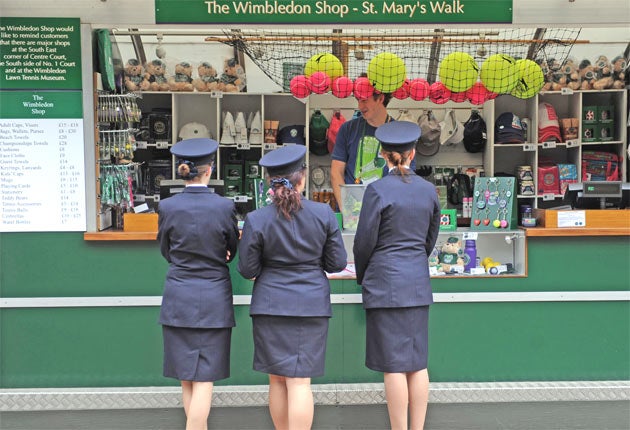Brian Viner: Behind the green and pleasant courts toils the unseen army that is 'Wombledon'
The Last Word

Like one of those ladies who lunch, of whom there are so many in Wimbledon, the tennis championships that have made the south-west London suburb so famous present a carefully made-up face to the world.
But what of Wimbledon beneath the make-up? In the bowels of the All England Club there are some lifts used only by staff, in which the graffiti tells a tale incompatible with the public message that all is sweet and wholesome and strawberry-flavoured. In one lift, a disaffected employee has scribbled – I can hardly bring myself to write this – the words "Fuck Wimbledon!" That is an act of lèse-majesté that you might think sufficient to force the ravens from the Tower of London, or the Wimbledon equivalent, to make the pigeons flee Centre Court. And yet it has had no effect on anyone or anything. It's just a small act of rebellion by someone fed up of working 14-hour shifts, or being bollocked by a self-important boss, or whatever.
He, or she, is probably one of the thousands of youngsters who make the championships tick along no less, in fact rather more, than the stewards and the referees and the line judges. The truth is that Wimbledon is run by a battalion of 20-year-olds. It is they who search the bags, work the tills, serve the drinks, wash the dishes, empty the bins, fold the linen and perform a hundred other small but vital jobs without which Rafa Nadal and Serena Williams would not get on court. Some of them operate without even the pleasure of natural daylight. The waste disposal team, not inappropriately, are like Wombles, scurrying around out of sight in the cavernous spaces underground.
It is not exactly slave labour, of course. Some of these kids are getting £100 a day or more, which at the end of two weeks, plus training days, yields enough for next term's tuition or a second-hand car. But the point is that, like an iceberg, 98 per cent of the monolith that is Wimbledon lies beneath the surface.
Sometimes, during one of those pesky showers, television viewers might be treated to a glimpse behind the scenes, perhaps of the people frantically stringing rackets, or of the full-time seamstress, but of the real nuts and bolts of the operation we never see anything. And actually that also applies higher up the food chain, in fact to the poached salmon and watercress salad level of the food chain, for there is even more corporate hospitality at Wimbledon than most of us realise. Every lunchtime, for example, the fragrant Annabel Croft is ushered in to offer some cultured pearls of wisdom to that day's guests of the Lawn Tennis Association. Sometimes, to their manifest delight, the former British No 1 confides a little bit of gossip. On Thursday, she told them that Venus Williams habitually eats like a horse before she goes out to play, but since the new locker-room rules banning food has had to smuggle it in and stuff herself in the loo.
Croft, I should think, makes a much more lucrative living out of tennis than she ever did when she was engaged in the demanding carry-on of hitting a ball over a net. But Wimbledon fortnight represents the biggest opportunity all year to coin it, not just for her but all the way down to the Orinocos, Bungos and Great-Uncle Bulgarias sorting out the rubbish, to say nothing of the malcontents with their marker pens.
Much Wenlock takes gold in pioneering the modern Olympics
The continuing brouhaha over Olympics tickets seems to call for a reflection on simpler times and, with perfect timing, a lovely book has just been published, written by Catherine Beale and called Born Out of Wenlock. It tells the absorbing story, with which some of us are familiar, but nowhere near familiar enough, of how the small Shropshire market town of Much Wenlock, and the efforts and vision of a Victorian surgeon, William Penny Brookes, gave rise to the modern Olympic movement.
The father of the Olympic Games as we know them is generally held to be a Frenchman, Pierre de Coubertin but, without the slightest doubt, Brookes was the grandfather. He it was who formed the Wenlock Olympian Society, and from 1850 invited competitors from all social backgrounds to take part in the Wenlock Olympian Games. In October 1890 Coubertin went to Much Wenlock to have a look for himself. Until then, Beale informs us, he had never uttered the words "Olympic Games" except in derision. Within four years he had formed the International Olympic Committee, and the rest is history, and ticketing cock-ups.
Zeros to heroes – it's o-ver to you
In the Wimbledon media bar late on Wednesday evening, I sat with two fellow hacks, and, in that way I have of raising the important topics of the moment, invited them to name the three former England footballers (male) whose surnames contain three Os. It must have been the lateness of the hour, or perhaps the couple of glasses of wine quaffed, but they thought and thought and then gave up. So, over to you.
Join our commenting forum
Join thought-provoking conversations, follow other Independent readers and see their replies
Comments
Bookmark popover
Removed from bookmarks